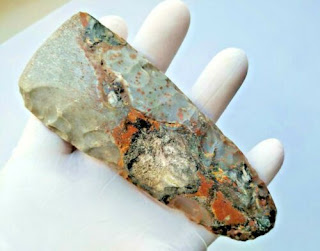1.0 Introduction
 |
| What price a piece of the past in your hand? (Photo: eBay) |
The Code of Best Practice for Responsible Metal Detecting in England and Wales sets out some of the basic principles, and in its fourth section it says that "being responsible means ...finding out about archaeology". Obviously the artefact hunter cannot take responsible decisions by perceiving the potential archaeological effects of their activities without that understanding. The 'Code' itself however, cannot help gain that understanding. It is formulated merely as do/don't principles, without explaining why. There is nothing available on this from the Portable Antiquities Scheme (PAS), Council for British Archaeology (CBA) or any other archaeological body in the UK.
This resource is therefore intended for members of the public and artefact hunters in particular to run through some of the basic issues involved with the archaeological record and the effects of artefact hunting on it and how they can be avoided. Britain is well-served by books on archaeological methodology, theory and practice, perhaps more than any other country in the world. The mass of material available, however, also renders a systematic survey of even a portion of the literature on the issue a daunting process. Another factor is the lack of consensus or a clear outline of the issues involved which may induce more confusion than enlightenment in the unguided explorer of these issues. The view presented here is my own, based on the literature cited, and is provided here as a basis for discussion.
This series of texts therefore aims to lay down a few paths to understanding the issues surrounding the responsible use of the archaeological record by artefact hunters, whether or not they are using a metal detector. While it represents a mainstream view, it does not claim to be either authoriative or exhaustive.
 Tamara Kroftova comments:
Tamara Kroftova comments:"It seems that there is a lack of consensus about what "best practice" is when it concerns artefact hunting and collecting. While in Britain, there has for some time been a Code of Best Practice for Responsible Metal Detecting in England and Wales (last updated in 2017), it does not seem to have attracted the attention of many people -landowners and artefact hunters included, besides which does not cover the entire range of issues that one might have expected it to address, such as the issue of curating an artefact collection and its attendant documentation".


Comments
Post a Comment